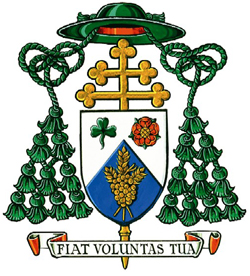Homily
[Jeremiah 20:10-13; Psalm 69; Romans 5:12-15; Matthew 10:26-33]
Recently, I was made aware of something rather surprising that had occurred in an episode of a popular TV game show. It even caught the attention of national media. Contestants were asked a question about the Lord’s prayer. They were presented with the line “Our Father, who art in heaven, [blank] be thy name”, and asked to fill in the blank. To the astonishment of the audience, none of the contestants knew the answer; they were unable to fill in the blank. The person who brought this to my attention was a non-Christian, and said “Even I know the answer to that,” and wondered aloud if this signalled a weakening of Christianity in our society.
Well, it certainly does, and we can all point to other indicators of what many call the post-Christian, or now even pre-Christian era in which we find ourselves. The need to evangelize, to find new ways to announce with joy and conviction the beauty and truth of the Gospel of Jesus Christ is pressing. Yet, when we turn to the scriptural texts for this mass, we encounter an invitation to ask ourselves what we might be “leaving blank” as we respond to the Lord’s call to make known to others all that he has taught us (cf. Matthew 28:19-20), not for lack of knowledge but fear of rejection.
The passage from Saint Matthew’s Gospel stands among a series of very straightforward instructions Jesus gives his followers about the persecution and denunciation anyone who follows him can expect to encounter. As we know, this is exactly what the Church has had to face throughout her history, and it remains true in our age. Christians in many countries today continue to be persecuted, even to the point of martyrdom, for professing their belief in Jesus Christ. In our country, although our lives are not threatened to that degree, nevertheless we do encounter negative reaction to the Church’s teaching on such things as the inherent dignity of every human person, God’s purpose for human love and sexuality, and the truth of human nature itself. As baptized followers of the Lord, each of us is called in our variety of circumstances to share with others everything that we have received from Jesus, yet fear of hostile reaction can tempt us into “leaving blank” from our testimony elements people do not like to hear.
Addressing precisely this situation, the scriptural texts today ring out with the call not to be afraid. The reason we need not fear is that the Lord is always with us. Consider what we heard from both the prophet Jeremiah and the apostle Paul. Both suffered serious persecution for fidelity to their vocation. Jeremiah draws enormous comfort – and the strength to continue – from the truth that the Lord is always with him, inspiring and accompanying his witness with the fullness of divine power. Saint Paul, meditating upon the wonder of what God has accomplished in Jesus Christ, proclaims with full conviction that the grace of Jesus Christ continues to abound, the grace of the Cross, which is always victorious over any evil in our world.
Jesus himself confirms this when he tells us to fear no one but God, whose authority and power extend over both body and soul. Yet notice here that Jesus is not encouraging a servile terror of God, as if we are to give witness to him only out of fear of punishment for not doing so. He points to a deeper motivation. Hear again what Jesus says: “Are not two sparrows sold for a penny? Yet not one of them will fall to the ground apart from your Father. And even the hairs on your head are counted. So do not be afraid; you are of more value than many sparrows.” What Jesus speaks of here is the very tender love of God for each of us, a love that both motivates and strengthens our witness. Our heavenly Father knows better than we do the challenges we face as disciples of His Son, so He is always near, in the power of the Holy Spirit, to provide both the words and boldness necessary to “fill in all the blanks” and thus proclaim in love the full truth of the Gospel.
This brings us back to the puzzle with which the game show contestants were presented. The answer to that question is the word “hallowed”. Filling in that blank properly, though, means more than simply furnishing the correct word. We hallow the name of the Father by adoring God and asking that His will be done in us by making us holy (cf. Catechism of the Catholic Church, 2807-2815). Our inner holiness will be visible in the integrity of our witness to Christ, and particularly by our willingness to “leave no blanks” as we share with others what we have received from him.
Of course, the one truly faithful witness to the love of God is Jesus himself (cf. Revelation 1:5). We can be faithful because Jesus gives us a participation in his own fidelity. This is exactly what he does for us every time we receive Holy Communion from the sacred altar, where we have rendered present his death on the Cross, his greatest act of faithful witness, in which nothing was left blank, nothing held back. So, in this Eucharist, let us pray that the grace of the sacrament will deepen our communion with the Lord Jesus, renew our zeal for the mission of evangelization, and strengthen us for bold and faithful witness.
Most Reverend Richard W. Smith
Saint Joseph Basilica
June 25th, 2023

